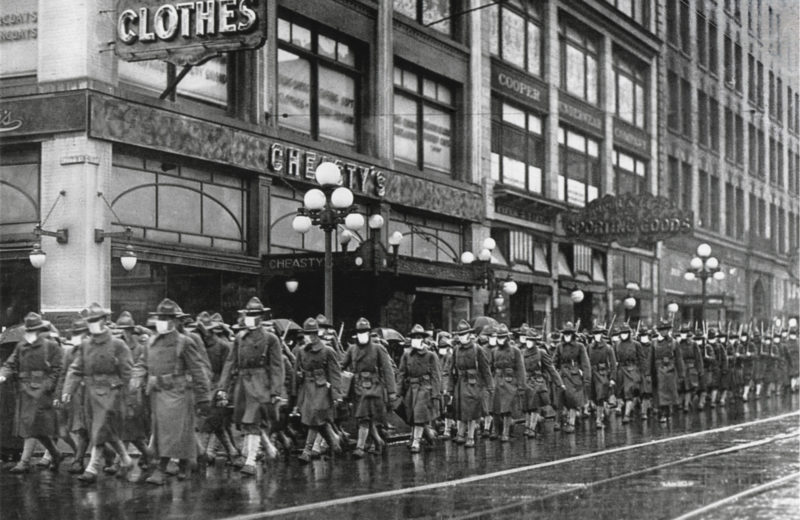Spanish Flu Was Awful But We Moved On Anyway

The temporary behavioral changes required to slow the propagation of the coronavirus entail real economic costs. These costs are difficult to evaluate given that the current situation is without recent precedent. Are there lessons to be drawn from the past that could enlighten us?
The answer is yes. There are three lessons to be drawn from economic history which could help us to better understand the current situation.
First, let’s analyze the case of a well-known pandemic that provoked an economic contraction, namely the Spanish influenza, which spread around the world toward the end of the First World War. Killing at least 50 million individuals in the span of a few months, the Spanish flu provoked a recession. The monthly U.S. data on industrial production and commercial activity suggest a drop of between 16% and 25% from July 1918 to March 1919. To put this in perspective, this is equivalent in terms of rapidity to the drop observed during the first four years of the Great Depression.
From these statistics, we can draw a first important lesson. Between March 1919 and January 1920, indexes of economic activity suggest growth of from 22% to 25%. The rebound would have continued had it not been for drastic changes in monetary policy that halted it. This is an impressive recovery given that the Spanish influenza cruelly attacked young adults—which is to say, those in the prime of life. Since the number of deaths currently projected is nowhere near those seen during the Spanish influenza, and the average length of recessions has been falling since the end of the 19th century, it is very possible that we will see a rapid recovery.
Faced with a temporary crisis, it is perfectly advisable to adopt targeted support measures in order to minimize the financial suffering of unemployed families.
The second lesson concerns the long-term effects of the reduction in potential economic growth caused by the Spanish flu. By examining the data on the health of young children and pregnant women, many studies show the significant consequences of the Spanish influenza. Being exposed to the disease in utero or at a very early age had the effect of limiting the academic achievements and the adult incomes of children affected by this flu. These effects were observed in many countries, like Japan, Sweden, and the United States.
Therefore, what should concern us is the long-term effect, namely the scars left by a health crisis. While not negligible, the damage caused to long-term economic potential by the Spanish flu does not seem immense. We should be reassured that Since the coronavirus does not at this time seem destined to reach the magnitude of the Spanish flu, we can expect long-term effects to be even lower. There is thus a reason to be reassured.
However, there is a third important lesson to draw from the empirical literature which measures the different factors that influence the speed of economic recovery following a major crisis (for example, a natural catastrophe, an epidemic, or a financial crisis). This literature suggests that countries with more flexible institutions do better. For example, a study published in the European Journal of Political Economy that studied 212 economic crises in 175 countries between 1993 and 2010 found that it is the countries with institutions that are the most open to competition and entrepreneurial activity that experience the least severe recessions, as well as the quickest recoveries.
And so, while support measures for affected workers are justifiable, governments have to make sure not to make life more difficult for entrepreneurs. If public policies are counterproductive, they can lengthen the recession and slow down the recovery. Prudence is therefore required, and excesses must be avoided, in order to minimize long-term costs.
These three lessons, taken together, should reassure us and guide us in the months to come.
Note: This is a summary of a study by the author for the Montreal Economic Institute.












